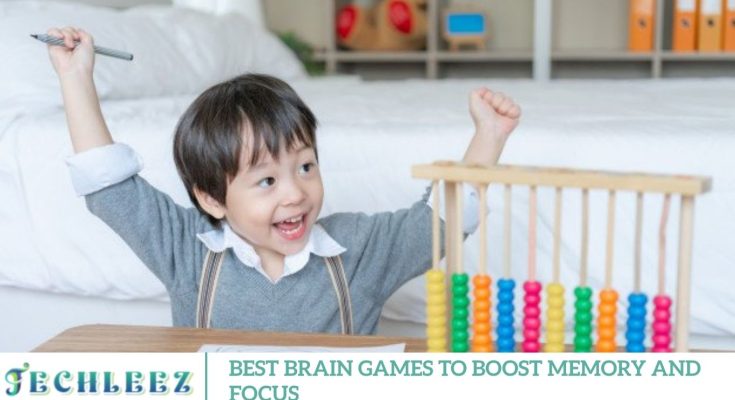Brain games serve as a mental workout, enhancing memory, focus, and problem-solving skills. These interactive activities are designed to challenge your mind while keeping you entertained. Whether you’re a student, a working professional, or a senior looking to stay mentally agile, brain games offer a fun and effective way to keep your cognitive abilities in top shape.
What Are Brain Games?
Brain games are specially designed mental exercises available in the form of puzzles, mobile apps, or engaging activities that aim to enhance cognitive performance. They focus on improving critical areas such as memory retention, logical reasoning, decision-making, and concentration.
Unlike traditional video games that mainly emphasize entertainment, brain games combine fun with learning and self-improvement. Their purpose is to challenge your brain and keep it stimulated through enjoyable yet productive mental workouts.
How Do Brain Games Work?
Brain games operate by engaging different regions of the brain through interactive challenges. For instance, memory games train the brain to recall sequences or patterns, while logic puzzles sharpen analytical thinking.
When played regularly, these activities strengthen neural connections, enhance mental agility, and boost reaction time. Many modern brain game applications also feature adaptive difficulty, meaning they automatically adjust to your skill level. As you improve, the challenges become more complex, ensuring consistent cognitive growth and engagement.
Features of Brain Games (In Detail)
Brain games stand out due to their well-rounded design and scientifically structured features, which make mental training both effective and enjoyable.
Variety of Activities:
From memory and math puzzles to logic tests and visual recognition challenges, brain games offer a wide range of exercises to target different areas of cognitive function.
Adaptive Difficulty:
As users progress, the game dynamically increases in complexity. This ensures the brain remains challenged without becoming frustrated or bored.
Progress Tracking:
Many apps include personalized reports and analytics that track your performance over time, helping you identify your strengths and areas that require improvement.
Suitable for All Ages:
Brain games are designed for everyone children, adults, and seniors alike making them an inclusive way to promote lifelong learning and mental health.
Short, Engaging Sessions:
Most brain games are designed to fit into short time slots, making them perfect for quick breaks or daily mental workouts.
Interactive and Rewarding Design:
Vivid graphics, interactive interfaces, and instant feedback make the experience enjoyable while motivating players to keep improving.
Mobile Accessibility:
Available across smartphones, tablets, and PCs, these games can be played anytime, anywhere turning idle moments into opportunities for mental growth.
Recommendations for Brain Exercises
Now that we understand which areas of the brain benefit from regular mental exercise, the next step is to identify which activities work best for each area.
People often ask, “What do you recommend as mental exercise?” or “Are crossword puzzles, Sudoku, and chess enough to strengthen my brain?”
The simple answer is yes and no.
These classic brain exercises do help maintain mental sharpness and are valuable for sustaining cognitive health. Engaging in familiar puzzles and strategy games keeps your brain active and alert, so they’re definitely worth including in your routine.
However, if your goal is to build cognitive reserve that is, developing resilient neural networks that can maintain function even if some brain cells are damaged you’ll need to go beyond repetition. Real growth occurs when you challenge yourself to move from a beginner to a mastery level.
To truly “flex” your brain muscles, you must continually expose your mind to new learning experiences. This means stepping outside your comfort zone and taking on fresh challenges that demand creativity, focus, and problem-solving in new ways.
Think about it have you ever wanted to learn French, earn a certification as a Master Gardener, or pick up a new game like Mahjong? Each of these activities introduces your brain to unfamiliar information and skills, helping you form new neural pathways and expand your cognitive capacity.
The key to maintaining a healthy, active brain especially as you age is continuous learning. Every time you take on something new, you’re not just gaining knowledge; you’re strengthening your brain’s ability to adapt, grow, and stay resilient for years to come.
Frequently Asked Questions
What are brain games?
Brain games are mental exercises designed to enhance cognitive functions, including memory, focus, logic, and problem-solving. They come in many forms puzzles, apps, quizzes, and strategy-based games and are created to keep your mind active while offering entertainment.
Do brain games really improve intelligence?
While brain games may not increase IQ, they do enhance specific mental skills, such as attention, memory, and reasoning. Regular practice strengthens neural connections and enhances overall mental agility, which can lead to improved performance in daily tasks.
How often should I play brain games?
For optimal results, play brain games for at least 15–20 minutes a day, several times a week. Consistency is key just like physical exercise, regular mental workouts yield better long-term benefits.
Are brain games only for older adults?
No, brain games are beneficial for all age groups from children developing cognitive skills to adults and seniors who want to maintain mental sharpness. Each age group can find tailored games suited to their cognitive needs and interests.
Can brain games prevent memory loss or dementia?
Brain games cannot prevent conditions like dementia, but they can help delay cognitive decline by keeping the brain active and improving mental resilience. Combined with a healthy lifestyle and proper nutrition, they contribute to long-term brain health.
Are mobile brain game apps effective?
Yes, many mobile apps like Lumosity, Elevate, and Peak are scientifically designed to target specific cognitive skills. Their adaptive difficulty levels and progress tracking make them an effective and convenient way to train your brain anytime, anywhere.
Conclusion
Physical fitness and brain games have proven to be an effective and enjoyable way to keep the mind sharp. These engaging activities do more than entertain they strengthen essential cognitive skills such as memory, focus, problem-solving, and logical thinking.
Whether you’re solving puzzles, playing strategy-based games, or using mobile apps designed for brain training, each session gives your mind a valuable workout. Consistent practice helps enhance neural connections, improve attention span, and build long-term mental resilience.




